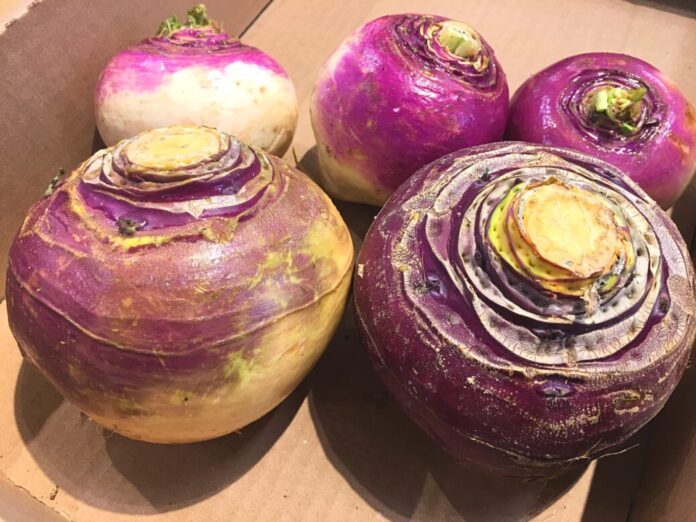The rutabaga (Brassica napobrassica), also known as swede or yellow turnip, is a root vegetable that belongs to the Brassicaceae family, which includes cabbages, broccoli, and turnips. Thought to have originated in Scandinavia or Russia, it is believed to be a hybrid between a cabbage and a turnip.
Appearance and Taste:
- Shape and Size: Rutabagas are round or slightly elongated with a bulbous base. They typically grow to about the size of a grapefruit, though their size can vary.
- Skin: The outer skin is thick, smooth, and usually a mix of yellowish-brown and purple hues, depending on the variety.
- Flesh: The inner flesh is yellow to orange and has a dense, firm texture.
- Taste: Rutabagas have a mildly sweet, earthy, and slightly peppery flavor, often described as a blend of cabbage and turnip.
Interesting Facts About The Rutabaga:
- Hybrid Origin: Rutabagas are believed to be a hybrid between cabbage and turnips, first cultivated during the Middle Ages in Europe. They combine the hardiness of turnips with the sweetness of cabbage
- Name Meaning: The name “rutabaga” is derived from the Swedish term rotabagge, meaning “root bag,” reflecting its bulbous shape and underground growth
- Scandinavian Staple: In Sweden, rutabagas are called kålrot (cabbage root) and play a key role in dishes like rotmos, a mashed rutabaga and potato dish often served with sausage
- War-Time Food: During both World Wars, rutabagas were essential for survival due to their ability to grow in harsh conditions and provide vital nutrients when food supplies were scarce
- Halloween Tradition: Early jack-o’-lanterns in Europe were carved from rutabagas or turnips, as pumpkins were not native to the region
- Cool-Climate Crop: Rutabagas thrive in cool weather and are best grown in late autumn or winter, as frost enhances their natural sweetness
- Vitamin C Powerhouse: Just one cup of cooked rutabaga provides about 35% of the recommended daily intake of vitamin C, supporting immune health and collagen production
- Bone Health: They are a source of calcium and phosphorus, essential minerals for maintaining strong and healthy bones
- Low-Calorie Option: One cup of rutabaga contains only 66 calories, making it a filling yet low-calorie choice for those managing their weight
- Rutabaga Curl: The Ithaca Farmers’ Market in New York celebrates the rutabaga annually with the quirky “Rutabaga Curl,” a competition where participants roll the vegetable across a field
- Wax Coating: Rutabagas sold commercially are often coated with wax to prevent dehydration and extend their shelf life, as their skin is naturally thin
- Color Transformation: When cooked, rutabagas’ pale yellow flesh intensifies to a rich golden hue, adding vibrant color to dishes
- Alternative Names: Known as “Swede” in the UK and Australia, they are also sometimes called “Swedish turnips” in other English-speaking regions
- Scottish Dish: Rutabagas feature prominently in the traditional Scottish dish neeps and tatties, a staple accompaniment to haggis
- Frost-Sweetened: Exposure to frost increases the natural sugars in rutabagas, making them sweeter when harvested during late fall or winter
- From Poor to Gourmet: Once considered a food for the poor, rutabagas have gained recognition in modern cuisine for their flavor and versatility
- Edible Greens: The leafy tops of rutabagas are also edible and can be cooked like collard greens or kale
- Blood Sugar Control: Rutabagas’ low glycemic index makes them a great choice for people managing blood sugar levels or at risk for diabetes
- Migraine Relief: Some studies suggest rutabagas may help reduce the frequency of migraines due to their nutrient profile
- Eco-Friendly Carvings: In some regions, rutabagas are still used as an eco-friendly alternative to pumpkins for carving during Halloween
- Global Festivals: While still underappreciated globally, rutabagas are celebrated in niche festivals and events like the Rutabaga Festival in Cumberland, Wisconsin
